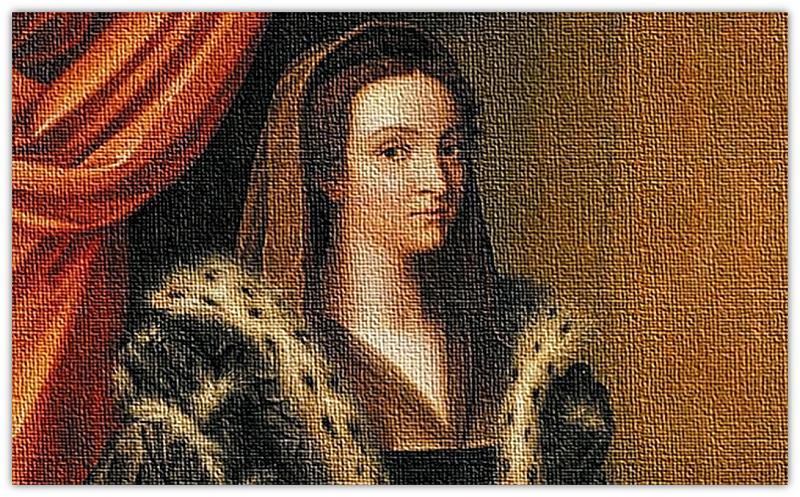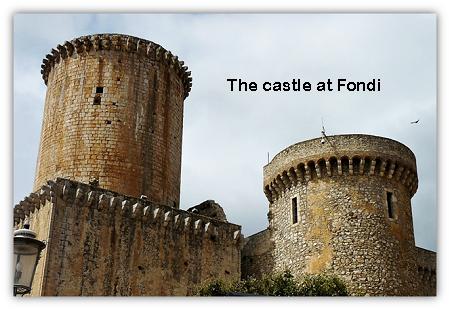Giulia Gonzaga Behind the Italian Reformation
Giulia Gonzaga Behind the Italian Reformation

If we could travel back in time to 1536 Naples, on a late Sunday morning during Lent, we may notice in front of the church of San Giovanni Maggiore two people immersed in serious conversation; a young Italian noblewoman named Giulia Gonzaga and a Spanish gentleman, Juan de Valdés. Their discussion, which continued for the rest of that day at Giulia's nearby residence, was life-changing for the young woman and later transcribed from memory by Valdés (with Giulia's help) as the main contents of his well-known work, Christian Alphabet .
The preacher that day had been Bernardino Ochino a Capuchin monk from Siena, who had gained fame throughout Italy for his passionate sermons. Thin, almost emaciated, he spoke powerful words with a soft voice. Some called him a modern Savonarola. Yet, while Savonarola preached mostly against the evils of his time, Ochino focused more often on theological issues, coming very close to Luther's doctrine of justification through faith alone,
Yet, Ochino carefully avoided dangerous statements. The doctrine was present but only implied, so subtle that Emperor Charles V, an avowed enemy of Luther's theology, stopping in Naples that day on his way back from a victorious Tunisian expedition, listened to his sermon with "great spiritual delight." In fact, in spite of his recent decree (issued right there in Naples) forbidding, upon pain of death, any conversation or practice with Lutheran heretics or suspected heretics, he commented that Ochino preaching was so touching that it could cause the stones to cry.
This was not the first time that Giulia had heard Ochino preach. In fact, she had sought every opportunity to attend his sermons, and they had initially given her much peace. Lately, however, they started to have the opposite effect, casting her in a whirlwind of perplexities and torment, wavering between heavenly and earthly thoughts.
Normally, I feel so dissatisfied about myself and everything in this world, she said to Valdés on that day and so listless that if you could see my heart I am certain you would be moved with compassion, filled as it is with confusion, perplexities and inquietude.
A Troubled Life⤒🔗
Somehow, Giulia had experienced anxiety, uncertainty, and turmoil for most of her life. Born around 1513 to a noble family in Gazzuolo, a small northern Italian city, she had been given in marriage at a young age (probably 14, if her estimated date of birth is correct) to a leader of mercenary troops and rich land-owner, Vespasiano Colonna, Duke of Tractto and Count of Fondi, twenty-seven years older than she. This was the classic marriage of convenience, as Giulia's family, looking for ways to expand their territories and influence, saw in Vespasiano the perfect catch.
We don't know how Giulia felt about this union, but Vespasiano was a man of war and stayed mostly away from home until he died in battle only two years later. In his will, he left everything to Giulia as long as she remained unmarried. In the event of a second marriage, all his properties would transfer to his daughter Isabella, who was about the same age as Giulia. This obviously caused a life-long tension between the two women.
At first, Giulia continued to live in her castle at Fondi, an ancient and charming coastal city between Rome and Naples, making it the center of a vibrant literary and artistic circle. Her beauty was extraordinary, inspiring many poets of her time. This was the Renaissance, a time when beauty was considered, as in ancient Greece, a symbol of completion and perfection, elevating the spirit, and not a spiritual danger as during the previous centuries.

Her close friend Paolo Carnesecchi said of her, "Such was the fame of her beauty and virtue that every gentleman who passed by those places tried to get to know her and to become her friend." Much to the men's disappointment, she always refused to remarry. Some say she valued her proper ties more than a marriage, but some sources indicate she may have been afraid of a new heartache. "If I remarry, I will always fear to lose my new spouse, and I don't want to run this risk," she apparently said.
Giulia came closest to a second marriage when a highly literate and powerful gentleman, Impolite de Medici, nephew of Pope Leo X, fell desperately in love with her. Initially, he was supposed to marry Isabella, but when he visited his bride to be, his feelings for Giulia got the best of him and prevented him from proceeding with the arranged marriage. Finally, Impolite confessed his love to Giulia, but before she could even consider the matter, his family pressured him into pursuing an ecclesiastical career, and social conventions demanded his compliance.
Soon after this, in the summer of 1534, a dramatic event shook Giulia's life, as her castle was attacked in the night by a band of Turkish pirates who had been raiding the Italian coast. Their leader, Chair ad Din (known to Italians as Barbarossa) Regent of Algiers, had heard about her beauty and decided to capture her and bring her as a present to Grand Sultan Suleyman I. He then sent a group of his pirates to break into her residence but when they entered they found that Giulia had already escaped.
Legend tells that, just when they were about to reach her room, a servant woke her and urged her to escape scantily clad through a window. Most probably, she had received news of the approaching danger some days earlier, since the pirates had been raiding many cities further south on their ascent through the Italian peninsula. We just know that she hid for a while in the nearby mountains of Ciociaria, until the Pope sent an army to repel the pirates and bring safety to the land. The papal army was led by Cardinal Impolite, who was able to play the hero in saving his beloved.
A year later, Impolite died of poison, comforted in his last agonizing hours by Giulia.
These traumatic experiences were probably some of the reasons why Giulia moved to Naples the same year, finally settling in a private home at the convent of Saint Francis. There, she had many comforts and servants, but lacked the luxuries and spaciousness of her palaces. She also had many visits from her friends, and (for some time) she had with her a very special companion: young Vespasiano, the son born to the short and passionate marriage between Isabella and Giulia's brother Rodomonte.
Apparently, a strong bond had formed between Giulia and Vespasiano because, after he moved to Spain to study and later worked as the King's advisor, he was able to divert the attention of the authorities from his grandmother's controversial religious activities.
A Troubled Heart←⤒🔗
As she conversed with Valdés on that spring day, Giulia focused however on some deeper troubles. Why, she wondered, did the best sermons fill her soul with torment instead of peace? How could she examine her heart, as most preachers exhorted her to do, without sinking into despair at the sight of her deep-seated and persistent sins? And why did these feelings continue to plague her in spite of fervent devotions, fasting, and discipline?
This is a great and crud contradiction, she explained, so bothersome and fastidious that I am often in tears, because I don't know what to do with myself, and I don't have anyone on whom I can lean.

To this distraught young woman, Valdés offered a shoulder to lean on. But he went further. He gave her a short theological introduction to the Christian faith, clarifying some issues she had never understood in her many years of faithful church attendance. Particularly important for her peace of mind was the distinction between law and gospel.
The law is important as a teacher, he explained, showing us both our duties to God and our failure to keep them, and driving us to Christ. He pointed out, however, the danger of preaching the law without the gospel or confusing the gospel with the law. "The law teaches us what we have to do and the gospel gives us the spirit which enable us to do it. The law wounds and the gospel heals. The law mortifies and the gospel gives life," he said.
Valdés was not a priest or a monk. He had never received any formal theological education. Still, he was vibrant and charismatic, and his influence spread quickly throughout Italy, particularly in the South. His followers, called spirituali, were united by a desire to bypass the simplistic superficiality of the church of their day to address deeper issues of salvation ands to live a more intense Christian life. They included, at least for a time, poetess Vittoria Colonna (Michelangelo closest friend), Pier Paolo Vèrgerio, Peter Martyr Vermigli, Cardinal Reginald Pole, and Bernardino Ochino.
Theologically Valdés didn't have the clarity of a Luther or Calvin (as is evident in the different theological choices his followers made later in life ranging from devout Roman Catholics to Calvinists to Anglicans to Anabaptists to Socinians to proponents of an impossible middle-way between justification by faith alone and justification by faith and works). But for Giulia, he continued to be a source of comfort. When, in 1537, he translated a first portion of the Psalms from Hebrew, he dedicated the book to her, knowing that her sensitive soul would find encouragement in David's frequent struggles and constant faith, and especially in the unconditional love of God, a theme Valdés emphasized in this collection.
In other letters and writings, he answered her fears of God's rejection by reminding her that, in Christ, she had been adopted as one of God's children, and needed to see herself as such, and not as a "daughter of Adam." "Because of Christ's sacrifice, God accepts you as his daughter," he wrote.
Escaping Execution by Her Death←⤒🔗
Fear and anxiety continued to raise their ugly heads from time to time in Giulia life, particularly when she lost her properties to Isabella or when her health became especially troublesome, but they didn't stop her from putting her whole heart in the religious cause at hand. After de Valdés death in 1541, she became the main preserver of his teachings, supervising the translation and distribution of his works and working hard to ensure good communication between the spirituali, On several occasions, we see that she was readily informed of their situations and needs, particularly in 1542, when the institution of the Italian inquisition as a permanent ordinance forced several Christians (including chino and Vermigli) to leave the country,
She also encouraged Marcantanio Flaminio, an Italian Reformer, to edit a writing by Benedetto da Mantova, Il Benefici di Cristo, which became arguably the most popular book of the Italian Reformation (some contemporary sources claim it sold 40,000 copies in six months). The text followed the progression of salvation from human perfection before the fall of man to assurance of salvation by grace alone through faith alone. It was one of the texts most hated by Roman Catholic authorities of that time, who finally destroyed it in 1549 and placed it on the list of banned books. Their objections were not based on Scriptures as much as on fear that a salvation founded on faith alone without works would lead to lawlessness and debauchery.
One of Giulia most faithful correspondents at this time was Pietro Carnesecchi, a Florentine follower of de Valdés, five years her senior, who had found in her a dear friend and trusted confidant. The two kept writing for years, revealing their innermost feelings, their views of European politics, their theological convictions, and their deep concern for the state of the church in Italy, especially for any of their friends who were in trouble with the Inquisition. A few times, when the shadow of the Inquisition loomed particularly close, Carnesecchi considered leaving the country, but Giulia encouraged him to stay because his departure would most certainly endanger his friends.

In the meantime, Giulia's health became increasingly frailer. At 37, she already felt the weight of her years. "By the grace of God, I have lived so long that I have become old," she said. At the beginning of 1566, wearied by aches and the tedious remedies prescribed by physicians (such as cauterization of wounds, a change of air, and thermal waters), realizing her remaining days were few, she wrote a testament leaving her main properties to Vespasian and some goods to Isabella. Carnesecchi could hardly bear the thought of her imminent death. "Do not think that I write this now with dry eyes," he said. "To live without you in this malign century is to navigate high seas without oars or sails."
Giulia died peacefully on April 16, 1566. She was 53. As predicted, Carnesecchi found himself almost immediately in very troubled seas. In her will, in fact, Giulia had not made disposition about her letters, which were found in a papal search. Of these, 228 were from Carnesecchi, who was summoned within days to the Court of the Inquisition. In the past, he had been able to dodge similar summons, but this time, betrayed by his host in Florence, he was arrested, interrogated under torture, and imprisoned.
At the process, Carnesecchi tried to shield Giulia and other friends, in spite of heavy and repeated torture, but soon some letters he had smuggled out of prison in an attempt to warn others of danger were intercepted, providing the Court of the Inquisition with further information and yet another accusation against him. Finally, Carnesecchi was executed in front of a large crowd on the first day of October, 1567. Being a nobleman, he was beheaded before being burned.
We don't know where Giulia was buried. She asked to be buried at the same convent where she had been living, but today there is no trace of her grave. Perhaps the pope, aware of her religious beliefs, denied her proper burial. An ambassador heard him in fact complain around that time that if he had seen those papers earlier, he would have burned her at the stake.
For most of her life, Giulia endeavored to keep alive in Italy the hope of a reform of the church according to Scripture. To other Christians like her, the highly publicized trial and execution of Carnesecchi seemed to put an end to all that. The message was clear: the Council of Trent was final and the Church of Rome was not going to say that men are justified by faith in Christ alone. In a country now mostly void of dissenting voices, the Inquisition then focused on mundane errors, while many Italian Reformers abroad went on to make massive contributions to the Protestant theology and church.

Add new comment